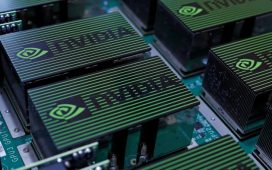Stay informed with free updates
Simply sign up to the US-China relations myFT Digest — delivered directly to your inbox.
The Biden administration has revoked export licences that allow Intel and Qualcomm to supply Huawei with semiconductors as Washington increases the pressure on the Chinese telecoms equipment company.
The move by the US Department of Commerce affects the supply of chips for Huawei’s laptop computers and mobile phones, according to people familiar with the situation.
The commerce department confirmed to the Financial Times that it had “revoked certain licences for exports to Huawei” but did not name which US companies would be affected.
“We continuously assess how our controls can best protect our national security and foreign policy interests, taking into consideration a constantly changing threat environment and technological landscape,” said a spokesperson for the department. “As part of this process, as we have done in the past, we sometimes revoke export licences.”
One person familiar with the situation said the commerce department had notified the companies that would be affected, but did not provide details.
Washington already has tough restrictions on the sale of American technology to Huawei, but Republican lawmakers have urged President Joe Biden to take even tougher action against the Chinese group, which national security officials say helps Beijing engage in cyber espionage around the world. Huawei has denied the claims.
“This is a significant action that indicates how seriously the US government is approaching — and not backing down from — what it views as national security threats from Chinese technology,” said Meghan Harris, an export control expert at Beacon Global Strategies, a consultancy.
“To the extent industry and foreign partners were watching to see whether the administration would soften its stance, this is a clear indicator that it will not — and we should anticipate any subsequent administration to continue on course,” she said.
The move comes amid US alarm at Huawei’s ability to develop advanced chips despite sweeping export controls introduced in 2022. When US commerce secretary Gina Raimondo visited China last year, Huawei released the Mate 60 Pro smartphone, which had an advanced chip that surprised experts.
Marco Rubio, the Republican vice-chair of the Senate intelligence committee, and Elise Stefanik, the fourth-ranking Republican in the House of Representatives, last month urged Raimondo to revoke Huawei licences after reports emerged that the Shenzhen-based group had built laptops using chips from Intel.
“It is clear from these trends that Huawei, a blacklisted company that was on the ropes just a few years ago, is making a comeback,” the lawmakers wrote in their letter.
After the release of the letter, Intel said it “strictly complies with all the laws and regulations in the countries where we do business”. Huawei’s MateBook X Pro laptop, which was released last month, uses Intel’s Core Ultra 9 chip. Intel declined to comment on the commerce department’s pending move.
Michael McCaul, the Republican chair of the House foreign affairs committee, has repeatedly urged the commerce department’s Bureau of Industry and Security to take a tougher stance on Huawei. In a letter last year, he raised concern that the Chinese group “can still buy significant amounts of US technology”.
“This was the right decision, but the licence never should have been granted in the first place,” Rubio told the FT. “The Biden administration needs to be proactive in denying Chinese companies critical technologies, not just reactive when they get called out by lawmakers who actually take the threat seriously.”
Qualcomm did not immediately respond to a request for comment. Intel declined to comment.
The FT reported last month that the US was pushing allies in Europe and Asia to tighten restrictions on the exports of chip-related technology to China because of rising concern about Huawei.









